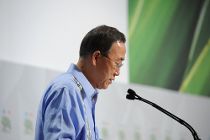Ban Ki-Moon urges nations to reach a more realistic agreement on day 8 COP16
UN Secretary General, Ban Ki-Moon, spoke yesterday (December 7) at climate change talks in Cancun, to encourage 190 nations to agree to steps to combat climate change.

UN Secretary General, Ban Ki-Moon, speaking yesterday (December 7) at climate change talks in Cancun, called for nations to agree on steps to combat climate change.
During a first session of environmental ministers and the 16th Conference of Parties (COP16), Ban Ki-Moon said: "We don't need final agreement on all the issues, but we do need progress on all the fronts. We cannot let the perfect be the enemy of the good." Ban Ki has been tasked with the tough job of persuading countries to agree to a fair deal, on ideas of how to cut greenhouse gas (GHG) emissions. This is proving difficult due to the conflict between developed and developing nations.
Ban Ki added: "Business as usual cannot be tolerated for it would condemn millions – no, billions – of children, women and men around the world to shrinking horizons and smaller futures. Cancún must represent a breakthrough,"
The UN Secretary General has repeatedly emphasised the need for lower ambitions to the outcome of Cancun, even though developing nations such as Bolivia are calling for a more radical solution. He told ministers: "The stability of the global economy, the well-being of your citizens, the health of our planet, all this and more depend on you."
Environmentalists are hoping that discussions at COP16 will mean the creation of a climate aid package deal, a fund that would slow deforestation, help vulnerable countries adapt to climate change and a mechanism to share clean technologies globally such as wind and solar power.
Mexican president, Felipe Calderón, warned that time was running out and called on nations to act now. He said: "I urge you, all parties, to make concrete here a balanced packet of agreements that will allow is to advance. A balanced packet of agreements that will allow us to already to take the first actions and steps because we can't wait any longer and time is running out,"
Speaking on behalf of Africa, Ethiopian Prime Minister Meles Zenawi, expressed he was "deeply dismayed" by the loss of momentum since Copenhagen. "Every day of delay is being paid for by the lives of countless numbers of Africans."
Delegates are still battling over the Kyoto Protocol, and whether to extend it beyond 2012, or reach a new agreement. Developing nations want to continue the first 2008-2010 round of Kyoto, which binds the emissions of nearly 40 developed countries and conflicts with the ideas of some developed nations. However, developed nations want to form a Climate Aid Package. Aid would promised by developed nations, for developing nations to help them avoid floods and droughts that have been caused by rising temperatures from global warming. The UN agreed to USD$30 billion, to be paid into the fund through 2010 to 2013 at Copenhagen last year.
Yesterday mass demonstration (about 1,500 people) assembled in Cancun, protesting against the low ambitions of the talks. The protesters threw eggs at riot police, defaced fast-food restaurants and dumped buckets of animal excrement.
Other protests included 3,000 peasant farmers, indigenous people and social movements from over 12 countries from all over Mexico and Latin America, who are in Cancun to protest against what they called 'false solutions'.
Peasants will be able to voice their opinions on Thursday in an alternative climate conference organised by Via Campesina, the international movement of peasant farmers. The meeting will be addressed by President Evo Morales of Bolivia and hopefully by other Latin American leaders later in the week.
Rural low paid workers reject carbon trading schemes, biofuel crops, geo-engineering and solutions proposed by the World Bank. "Peasant agriculture not only contributes positively to the carbon balance of the planet, it employs 2.8 billion people and remains the best way to combat malnutrition," says Josie Riffaud, a French farmer.
Author: Charity Knight | Climate Action
Image: UN Climate Talks | flickr






